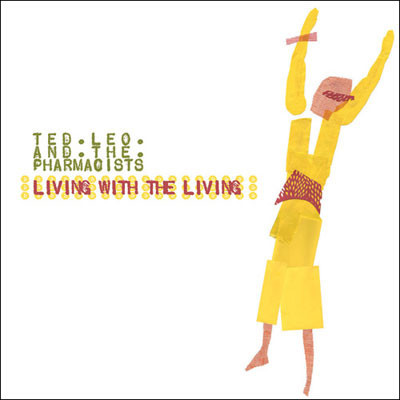One of my friends, Brad, is—or was—super into Ted Leo. I might have even gone to a Ted Leo show with Brad while I still lived in Boston. Email records also suggest that my wife and I might have caught a Ted Leo show at the South Street Seaport in New York City in the mid-2000s—when he was still on Lookout Records—but recollection falters. In any event, Ted Leo is someone whose music I like, whom I appreciate—but whom I wish hit me harder or landed more solidly somehow. With his energetic, persistent, and prolific approach to modern-day political anthems along the lines of Billy Bragg, the Clash, and Stiff Little Fingers channeled through a bit of Elvis Costello or perhaps Nick Lowe, I would like to appreciate Leo more.
So I keep buying Ted Leo records. I don’t necessarily seek his music out on an ongoing basis, but there was a time when if there was new music to be had, I picked it up. This compact disc was bought in that spirit 15 years ago—not as an obligation, mind you, but as another step toward a further understanding of, a deeper appreciation for, and a stronger embrace of Leo’s approach to songwriting.
Reconsidering this record, Leo’s first on Touch and Go after a short stint on Lookout—and his fifth album with the Pharmacists overall—I can appreciate it differently, perhaps better than I could when it first came out. Interestingly, neither it nor the accompanying five-song Mo' Living EP (which includes a Chumbawamba cover!), plays on my portable CD player, so I’ve not been able to listen to it with headphones. Slight and meaningless irritation aside, there’s a lot of good to listen to with room sound, and the record might be better suited to more energetic (even ambient) than attentive listening.
The fourth track, “Who Do You Love?,” is a wonderful example of power pop. “Colleen,” a slight diversion from the previous songs, offers borderline psych pop before reverting to Costello-style bash pop—overall, an excellent song. Immediately following, “A Bottle of Buckie” brings a little more of a heartland, country feel, though it’s still relatively fast paced. Listening to this song, I can hear a little bit of regional rock influence such as that of Bruce Springsteen or the Gaslight Anthem peek through. The song’s instrumentation is marked by brief moments of tin whistle and mandolin or another stringed instrument. “Bomb. Repeat. Bomb.,” the most explicitly political song on the album so far, is more hardcore in its orientation, reminding me briefly of the Minutemen before its Make-Up-like chorus. The moments of Washington, D.C.-like hardcore and angular guitar are aided by Brendan Canty, who partly engineered and mixed the record.
I particularly enjoyed the one-two punch medley of “Annunciation Day,” with its rapid-fire presentation, and the strident yearning of “Born on Christmas Day.” Following the slightly quieter reggae track “The Unwanted Things,” Leo returns with the near U2-inspired white soul modulating song “The Lost Brigade.” The album ends with several higher-energy numbers interrupted by the slow-paced, soulful “The Toro and the Toreador,” finally bringing the record home with force. “The World Stops Turning” is particularly excellent.
Topics addressed on the album include loss, trust, strength and self-sufficiency, thoughts of home, military aggression, hope and faith, empathy, community and discord, self-doubt, sorrow, and certainty.
By the end of the record, I realized that Leo is a large-hearted master of multi-genre assemblage. (The sound collage that opens the record makes strong sense in that context.) He appreciates and endorses punk and hardcore, regional roots rock, reggae, white soul, power pop, and other genres—combining them into his own approach to independent rock. That can result in a songwriting—and album sequencing—challenge. How do you combine all the music you love in the music you make? How do you offer the breadth and depth of the music you feel inside without disorienting or distracting the listener? Can you capture the ideas and ideals of all the songs inside of you in every single song? “Every little memory has a song,” Leo sings. After all, this isn’t a Mr. Bungle or Naked City record, where genre-hopping is kind of the point.
But it is a Ted Leo record. Almost Ted Leo radio. And that makes it worth listening to on its own terms and as it is. Leo is an impressive and important creative voice regardless of how each song or album lands.





No comments:
Post a Comment